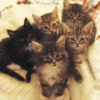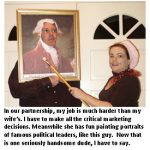
This is my family (2012 photo). At left is our younger daughter Emily. At right is Rachel (older by one year). The guy next to Michele, attempting to hide their receding hairline, would be me.
My wife Michele is originally from Toronto, Canada. I was born in Albany, NY. Somehow, through an odd circumstance of good fortune, we ended up moving to Seattle in 1991. (But that’s a story for another time). We are adoptive parents of two high-spirited daughters, Rachel and Emily. I often tell people Rachel is the greatest Christmas gift I ever received, while Emily is the greatest birthday present I ever received. I will explain why in this story about how our rather international family came to be.
When we began thinking about starting a family, we eventually learned we would be unable to have biological children. While for some couples, this is a source of tremendous grief and loss, I never felt that way. To me, it just meant we would start our family in a different, admittedly unexpected way – through adoption.
We eventually decided to adopt from China – in part because we had read that each year there were tens of thousands of children without families – mostly girls – that were forced to grow up in orphanages. And conditions in these orphanages varied greatly from city to city. China required the adoptive parents to travel to China (unlike some nations where the babies are flown to the states to meet their new parents). We would be required to spend roughly ten days in China to complete the adoption and get approval to leave the country with our new baby. We had no idea what to expect.
We quickly let go of the notion that our child might have blue eyes, reddish hair, and freckles. But still, it was more than a little surreal to think that many thousands of miles away in a city we’d never heard of, there would be a tiny, four-month old baby who was somehow destined to become our daughter. And then, twelve months later, we would fly to China to adopt a second baby to complete our family.
Our daughters, Rachel (now 28) and Emily (27) will someday tell their own adoption stories. But this is how I experienced it. In the late 1970s, China adopted a one-child policy. The rationale was to reduce the growth rate of China’s enormous population. (China discontinued this policy in 2016.)

This is a photo from our very first evening with Rachel – while we were still in China. At first, Rachel protested vociferously against going to sleep. I quickly learned to pat the bed next to her in a constant thumping sound, which soothed and quieted her down.
In rural China, the tradition going back 5,000 years was for young couples to move to be near the husband’s family and take care of his parents when they grew old. As a result, in rural China, if you could only have one child, it made economic sense to prefer having a son over a daughter, so you’d have someone to take care of you in your old age. It was a form of social security throughout most of China.
An unfortunate result of this one-child policy was that every year, for decades, thousands of baby girls were abandoned (or worse) – often placed in early morning hours outside of a government building, in the hopes they would be quickly rescued and taken to an orphanage.
In August 1994, we began the paperwork to adopt. About the same time we submitted our application, a tiny baby girl, later given the name of Yong Li by the orphanage, was born in a rural village in southwestern China outside of the city of Kunming. A few months later, we were matched with her and assigned a travel date to fly to China: Christmas day.

As a toddler, Rachel loved food – especially playing with it. On her 1st birthday, she tried a piece of birthday cake for the very first time. At left, she is contemplating what exactly to do with her cake. At right, Rachel about ten minutes later, having annihilated the cake.
But our adoption almost fell apart the night before we would leave for China. We were planning to travel with Michele’s mother. We celebrated the holiday the night before, at my brother Bob’s house. Because I had arrived at Bob’s house from work, we had taken separate cars, with Michele and her mom driving to Bob’s house from home.
Around 9pm, I arrived home before Michele and her mom. I saw that the answering machine had a message. It was from Bob: “Tim, go to Evergreen Hospital as soon as you can. Michele and her mom have been involved in a very bad car accident. They’re in the hospital. I don’t know how serious it is.”
I drove to the hospital with competing anxious thoughts racing through my mind: How badly were they hurt? Would they both be okay? What would happen to our plans to fly to China? Would we lose this baby? Would I be flying there on my own? Once at the hospital, I learned that Michele was okay – badly shaken, but okay. Her mom was badly bruised, but no broken ribs. The car was a total loss. But they were cleared by the doctor to fly to China – barely.
We got to the airport on Christmas morning. Michele’s mom required wheelchair assistance in order to board the plane. We arrived in Kunming in Yunnan province and filled out the first of what would be many rounds of paperwork. The next day, they brought us, along with three other couples, to the orphanage where little Yong Li had been since she was born in late August.

Emmy loved to play with the most unusual toys. She decided to try this new fashion statement, and I think she figured out she was being funny, because Michele and I laughed out loud.
When they presented a little baby girl to us, Michele and I were confused and concerned. The baby they gave us, Michele knew, was NOT our baby – based on the one photo we had previously been given. She handed the baby back and told the orphanage staff person, “That’s not our baby. Can you please look for our baby?”
A few minutes later, our facilitator came with another baby. And we knew in an instant this was little Yong Li. We kept her Chinese name as part of her name, because it meant “forever beautiful” and because we felt it would be a way to remind her of her Chinese heritage.
The moment I first held our four-month old baby in my arms I fell in love. I knew in that instant that I could not possibly love a child more than I loved this little baby. She didn’t look anything like me. I didn’t care. I am convinced to this day, she was destined to be our daughter. I bonded with her in a heartbeat. Then she threw up violently all over my clothes. That’s when I learned about the need to pat a baby’s back after she’s consumed formula.
I thought about how terrifying this whole ordeal must have been for this tiny infant. We didn’t look, smell or talk like anyone she had ever seen. Here we were, two complete strangers ripping her from the only world she had ever known. Then we would whisk her thousands of miles away to a world she knew nothing about. She had no say in any of this. She had to be feeling some level of panic.
We always knew we wanted to adopt a second baby from China. We’d probably wait three years, like many families do between kids. But in the ensuing months, we read news stories that China was preparing to close international adoptions to the United States, in part due to some negative news coverage in the US about Chinese orphanages. Concerned that the door might close forever, we accelerated our plans and filed an application to adopt a second child who we were pretty sure would be another girl. We would name her Emily.

By the time she reached pre-school, Emily overcame her introversion and blossomed into a very outgoing, energetic person. She was always very short for her age, so other kids liked to carry her around like a doll.
When we were approved, we were matched with a baby girl, estimated to be around 3 months of age at the time (but it’s just an estimate – they rarely know the actual birthdate of these babies – unless someone pins a note to their clothing). We were assigned a travel date of January 10, 1996 – my birthday. Ours would be the second to last group of American families permitted to adopt from China, before they closed the door on adoptions with the USA for several years.
We flew to Nanchang, in the province of Jiangxi, China, along with eight other couples. The baby waiting for us was named Jiang Qiu (pronounced “Ji-AHNG Choo”). It meant “Autumn River” (well, technically, “River Autumn”) and we decided we would keep her Chinese name as part of her middle name, like we did for her sister.
When we landed in Nanchang, our facilitator asked us all if we would like to see pictures of our babies. Until that moment, none of us had seen a photo of our matched child. I will always cherish the photo of Emily that they handed to me. In the photo, she had the most intense expression on her face. I remember thinking to myself in that moment, “I have a feeling this little baby is going to be VERY high-spirited.” I had no idea how accurate my prediction would eventually turn out to be.
We were supposed to go to our hotel and get a good night’s sleep before meeting our babies the next day. But then, in the airport parking lot, our facilitator asked, “Would you like to meet your babies tonight?” I distinctly recall thinking to myself, “Um, I really could use one final good night’s sleep” but everyone else shouted, ‘Yes, Yes, Yes!!”
So, we got to our hotel and within minutes, the nine babies were presented, one after another. The very last one called out was “Jiang Qiu” – our baby. She was so tiny – the smallest of the nine infants. And beautiful. Wrapped in five layers of clothing, the outermost layer being a red sweater, which we have kept to this day. Unlike Rachel, who was almost completely bald when we met her, Emily had a full shock of thick black hair.
We had a couple days in Nanchang to go sightseeing. So picture this: nine middle-aged Caucasian couples, walking around, carrying Chinese babies. We stuck out noticeably. We never saw another Caucasian our entire time in this city. I was carrying Emily on my chest. A man wearing a snuggly no doubt must have appeared even more unusual to the local population.

One of the many photos of Rachel (L) and Emily (R) from early childhood. I am guessing they are roughly 5 and 4 in this photo.
Before long, we became a bit of a curiosity for onlookers, especially elderly women, who seemed confused about why all of these white people were walking around carrying Chinese babies. One woman came uncomfortably close to me. She appeared to be scowling in disapproval. Then I presented to her a note, written in Chinese, that I had asked our facilitator to compose. The note read: “We are from America. This little baby girl is an orphan and has no home. We have come to adopt her and give her a forever home.”
Upon reading this note, the woman paused, looked at me, then at Emily, and suddenly her scowl turned into a huge smile. She gave me two enthusiastic thumbs up, then stroked Emily’s cheek gently. She could not speak English any better than I could speak Mandarin. But there was a quiet, unspoken connection, as she nodded, smiled, and showed the note to many of the other dozen women who had gathered around us. All of them started smiling and patting the babies’ cheeks.
By the time we arrived home with Emily, then about four months old, Rachel, almost 17 months old at the time, was thrilled. To her mind, we had brought her back her very own doll to play with. At first Emily was a bit overwhelmed by Rachel’s overpowering personality. But as the months and years went by, Emily stepped out from behind Rachel’s shadow to discover her own equally strong-willed personality.
In their early years with us, every night, we would hold them before putting them down for bed. I would kiss them on the top of their heads and tell them, “I love you to the universe and back.” I have often thought, yes, this is the family I was meant to have.

When Rachel (L) was 17 and Emily (R ) was 16, they traveled with Michele to China for three weeks. During that trip they visited three orphanages. It was their first trip back to China. This was, I believe, a life-changing experience for them. The photo of Emily is my single all-time favorite photo ever taken of her.
When Rachel was 17 and Emily was 16, they went back to China with Michele one summer as part of a group of adoptive families that visited several tourist sights of China, including the Forbidden City and the Great Wall. They also spent several days volunteering at three different orphanages. It was a powerful experience for both of them. Both girls told me how heartbreaking it was to have to say goodbye to these innocent children who most likely would never have the kind of lives Rachel and Emily had experienced.
A day does not go by that I don’t stop to reflect on the miracle that is our adoption journey. Like any other parents, we have had our challenges. And we have made our share of parenting mistakes. Both our girls went through the terrible teenage years in which at times, they would cause us many anxious moments and sometimes endless frustration. But both of them made it through those turbulent years and are leading for the most part happy and productive lives. We are deeply proud of both of them.
I often think about their birth parents and the pain and sadness they must have felt – and continue to feel – over having to make the most difficult decision any parent could possibly make – to let their beautiful babies go, for whatever reasons compelled them to do so. If I could wave a wand and make it possible for Rachel and Emily to meet their birth parents I would do it in a heartbeat. I wish I could somehow meet them just to let them know their baby girl found a good home, had a happy childhood, and is deeply loved.
People have said to Michele and me countless times that our two girls are “so lucky to have been adopted by you guys.” But I don’t see it that way. To me, Michele and I are the lucky ones. As we wrote on our adoption announcements: We didn’t give our two daughters the gift of life. But life gave us the gift of them. And they will forever be the greatest gifts Michele and I have ever been blessed to receive.
That’s the view from the bleachers. And no, I’m definitely not off base.
 PS: If you enjoyed this week’s post, let me know by posting a comment, giving it a Like or sharing this post on Facebook.
PS: If you enjoyed this week’s post, let me know by posting a comment, giving it a Like or sharing this post on Facebook.
Subscribe to my new View from the Bleachers YouTube Channel and request notifications to see my latest videos. And check out my new book, THE SECRET TO SUCCESS AND HAPPINESS (is Something I Have Never Figured Out. I’ Open to Suggestions).











Love this, Tim! What a wonderful story. I say all four of you are lucky!!!
This story brought tears of happiness as I will never forget the opportunity you and Michele gave me to accompany you to China. The bonding we had to Rachel’s picture. The fact that I was an instant grandmother. Happiness beyond saying.
The car accident was frightening. As the doctor was examining me I said “I’m going to China in the morning”. Oh, he said, but first we’ll take some X-rays. He then went to the waiting room to say he was concerned about my statement. You, Tim said “yes she is”. And then you explained the rest. Thanks for taking me down memory lane. See you tomorrow.
Oh, to be as loved as a child whose parents have crossed the globe to adopt her. How lucky those girls (and you both) are to have found each other.
I know most of the story except the part about the car accident. Yikes! It brought tears to me eyes to read your lovely description of your adoption journey.
A beautiful heartfelt story. Thank you for sharing it
Lovely story and journey for you all,
You and Michelle just have so much love for your daughters…my eyes are welling up buddy!
Thank you for sharing that Tim. You chocked me up! My old best friend adopted two girls from Russia, about the same time you adopted. They too have very interesting and harrowing stories of getting their children. Bless you all.